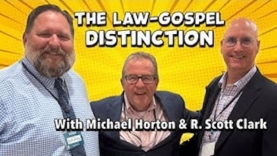In its covenant form, [the Law] serves to show them what Christ, the second Adam, did and suffered in their stead. By requiring from all who are under it perfect holiness of nature and perfect obedience of life with complete satisfaction for . . . Continue reading →
Heidelcast For January 26, 2025: Comfort of the Covenant (21): Three Ways of Exercising the Prophetic, or Teaching Office
In this episode Dr Clark continues the series, “The Comfort of the Covenant.” Continue reading →
Psalm 14: The Heart Talk Of Fools (Part 2)—The Foolishness Of Fallenness
Why does Psalm 14 focus on the foolishness of sinners? It does so to highlight God’s sovereignty despite the wrongs that are out of place in the world. Sin and its fallout are not what ought to be. These shortcomings about the . . . Continue reading →
The Marrow: Seeing Evidence Of Faith Is Not A Return To The Covenant Of Works
Ant. But I pray you, sir, is not this his reflecting upon himself to find out a ground to lay his believing that he hath believed upon, a turning back from the covenant of grace to the covenant of works, and from . . . Continue reading →
Heidelminicast: Ordinary Means Ordinary (10): Is Efficiency a Virtue in the Church?
Dr Clark continues the series “Ordinary Means Ordinary” Continue reading →
Christ Fulfilled The True Covenant Of Works
Christ fulfilled the true covenant of works by being born under the Mosaic law as the situation most resembling it. Mosaic typology thoroughly signified Christ’s obedience. Read more» Harrison Perkins | Reformed Covenant Theology (Bellingham, WA: Lexham Press, 2024), 331. (HT: Reformed Dogmatika) . . . Continue reading →
A New Heidelcast Feature Debuts Saturday, February 1, 2025
We do not want to give away too much but a new weekly Heidelcast episode begins Saturday, February 1, 2025. If you have not yet downloaded the HeidelApp or subscribed to the podcast where ever podcasts are found, you will want to . . . Continue reading →
The Black Rubric And The Creator-Creature Distinction
The “Black Rubric” was so-called because it was set in black print in the 1661–1662 edition of the Book of Common Prayer. It was first inserted into the Second Edwardian Prayer Book in 1552. It was intended to explain that when communicants . . . Continue reading →
Dr Clark With Dr Michael Horton And Keith Foskey On The Distinction Between Law And Gospel
In this interview our own Dr Clark sat down with his Westminster Seminary California colleague Dr Mike Horton and with pastor Keith Foskey while they were together at the recent Re-Formation Conference at Paramount Church, Jacksonville, FL to answer questions about and . . . Continue reading →
Formula Of Concord, Solid Declaration On The Use Of The Law For Christians
And, indeed, if the faithful and elect children of God were perfectly renewed through the indwelling Spirit in this life, so that in their nature and all their powers they were completely free from sin, they would need no law, and therefore . . . Continue reading →
Review: The Psalms: A Christ-Centered Commentary By Christopher Ash—Part 1: Intro Volume
Good commentaries that are useful for preaching are hard to find. Rarely do commentators manage to blend exegesis, theology, and pastoral significance together very well. When it comes to the Psalms, several good commentaries exist that address strictly exegetical issues, dealing with . . . Continue reading →
Coming In 2025: The Heidelberg Catechism: A Historical, Theological, & Pastoral Commentary
The Heidelberg Catechism: A Historical, Theological, & Pastoral Commentary (Bellingham, WA: Lexham Press, 2025) is available for pre-order now. The original and irreplaceable commentary on the catechism was composed of lectures given by the catechism’s primary author, Zacharias Ursinus (1534–83) but over . . . Continue reading →
Heidelminicast Q&A: On Being Fed by Christ
In this episode Dr Clark answers a listener question on Christ. Continue reading →
Heidelminicast Q&A: Are Weddings and Funerals Church Services?
In this episode Dr Clark answers a listener question on weddings and funerals. Continue reading →
Riddlebarger on “Why Then the Law?”
In Galatians 2:16, Paul makes his case that “a person is not justified by works of the law but through faith in Jesus Christ, so we also have believed in Christ Jesus, in order to be justified by faith in Christ and . . . Continue reading →
The Federal Vision (Part One): Redefining Covenant And Justification
I have heard it before and I will hear it again, “The Federal Vision is dead. Move on.” Though it is true that the Federal Vision (FV) is now well over twenty years old, it has lost none of its steam in . . . Continue reading →
Trueman: What Thielicke Can Teach Us About Nihilism
Bonhoeffer may be the most famous German theologian to oppose Hitler and Nazism, but he was not the only one. Another who speaks to our times is Helmut Thielicke, a Lutheran theologian and pastor. Like Bonhoeffer, Thielicke was hounded by the Nazis, . . . Continue reading →
Ascension Presbyterian Update
The theme of all good church planting updates is the faithfulness of God. This one is no exception. Perhaps that has to do with the ever-faithful God whom we worship. Continue reading →
Heidelminicast Q&A: Help! My Church Used to be Reformed But Now It’s Not. What Should I Do?
In this episode Dr Clark answers a listener question on doctrinal shifts in their church. Continue reading →
Top Five Posts For The Week Of January 13–19, 2025
These were the top five posts for the week of January 13–19, 2025. Continue reading →









